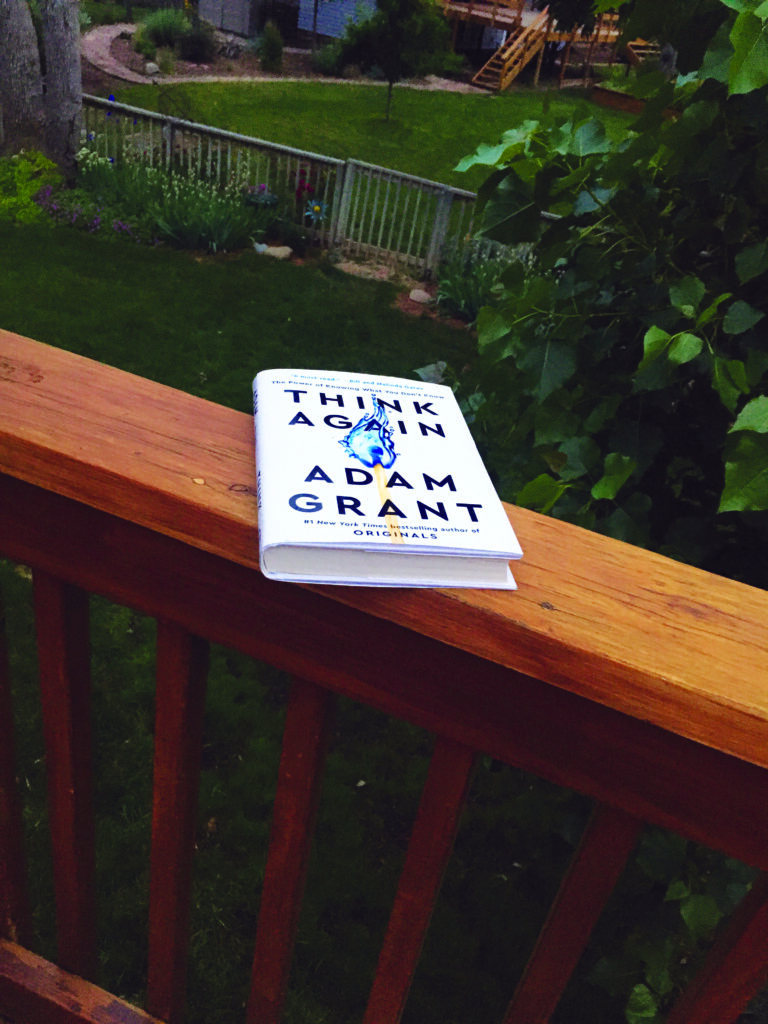
My mother is a clinical psychologist who began her academic work a bit later in life than is typical; which is to say, I was raised by a woman practicing to practice psychology. Since she will likely read this, I’ll say only that I approach the field of psychology with preconceived notions that may or may not be grounded in reality.
I think of this now after encountering psychologist Adam Grant’s Think Again: The Power of Knowing What You Don’t Know. In one of many enlightening and humorous anecdotes, we learn that Grant is not “that type of psychologist.” He is rather, among other things, an organizational psychologist who teaches at The Wharton School of Business and much of his work is dedicated to social dynamics within business environments. With that said, Think Again delves into the behaviors and tendencies of the human condition with broad applications to living a life where happiness derives from actively engaging others; especially those with whom we may disagree.
Grant’s primary insight is that we should approach our differences with curiosity instead of antagonism. And, most importantly, we must be willing to rethink our own beliefs by opening them up to regular scrutiny.
This, of course, is no small task in 2021 because, as Grant writes, “Our opinions can become so sacred that we grow hostile to the mere thought of being wrong…” Personally, I couldn’t help but read this one with politics in mind although Grant, for the most part, positions his commentary far above that dirty business. Nonetheless, his observations clearly inform the current socio-political divide.
Perhaps one of the most glaring problems in American society today is that it is so easy to huddle up with sources of information and spend time only with people that confirm opinions we already hold. Breaking this cycle of tribal behavior, Think Again asks us to “learn something new from each person you meet” and “practice the art of persuasive listening.”
“Don’t shy away from constructive conflict,” Grant advises. Indeed, my favorite chapters in the book are titled “The Good Fight Club” and “Charged Conversations” in which the extremely popular TED-talker encourages thoughtful and productive debate; not with the goal of being right and proving others wrong, but by tangling with them in order to learn. Argue as if you are right but listen as if you are wrong, the professor recommends.
It is refreshing that a pedigreed thinker like Adam Grant still seems to have hope for us. He does, however, recognize the pitfalls of spirited conversations in the Age of Trump. “The moment people feel that we’re trying to persuade them,” he warns, “our behavior takes on a different meaning. A straightforward question is seen as a political tactic, a reflexive listening statement comes across as a prosecutor’s maneuvering, [and] an affirmation of their ability to change sounds like a preacher’s proselytizing.” So, rather than debate like a politician, prosecutor, or preacher—his analogy—Grant suggests approaching our disagreements as would a scientist; relishing the debate as a pursuit of new learning, and questioning our own beliefs just as we would question those of our rhetorical adversaries.
To make this work, Grant says that we must, like a good scientist, “embrace the joy of being wrong,” primarily because learning that one is wrong means one is now less wrong. Of course, this can’t happen as long as “argument” is viewed as the symptom of a deteriorating relationship. The reality is that, in an era when the divisions are so great, we are often encouraged to avoid arguments for the sake of relationship.
In Grant’s view, on the other hand, to argue with others is a sign of respect. “It means I value their views enough to contest them. If their opinions didn’t matter to me, I wouldn’t bother.” Further, “avoiding an argument is bad manners. Silence disrespects the value of your views and our ability to have civil disagreement.”
Grant also has no patience for conversation-enders such as “I’m entitled to my opinion” or “we’ll just have to agree to disagree.” “[Y]es, we’re entitled to hold opinions inside our own heads,” he says, “If we choose to express them out loud, though, I think it’s our responsibility to ground them in logic and facts, share our reasoning with others, and change our minds when better evidence emerges.” In another age this type of comment would be taken as common sense; in our own, it might just be the medicine we all need.
I would like to think that I have argued with a Grant-like assertive civility even before reading his book. The sad truth, though, is that my recent efforts have resulted in some ugly moments and the loss of two friends.
However, as Grant admits, there are those situations where even the best-intentioned approach to human discourse might not be enough. For instance, if you find yourself conversing with someone wearing a large Q on their t-shirt, you can probably just throw all this out the window. Now that I say this, however, I am compelled to demonstrate my flexibility by heeding Grant’s advice. So, if confronted with some plausible evidence that there actually exists a cabal of bloodthirsty, pedophilic, Satan-worshipping, baby-sacrificing Democrats out there, I’ll be happy to reconsider my position.
My former friends are not believers in QAnon—at least I don’t think so—but it is clear that their views are cast in cement hardened by a media stream that offers little encouragement to rethink their ideas. Perhaps I should gift them a copy of Grant’s book… or, maybe not.
“Too many of us get trapped in mental prisons of our own making,” Grant recently said. “But if we could be committed to rethinking, we might have a slightly more open-minded society.”
Call me a cynic in the face of all this positive thinking but the celebrated Adam Grant of The Wharton School seems to be hinting that “slightly more open-minded society” might be the best we can hope for.




